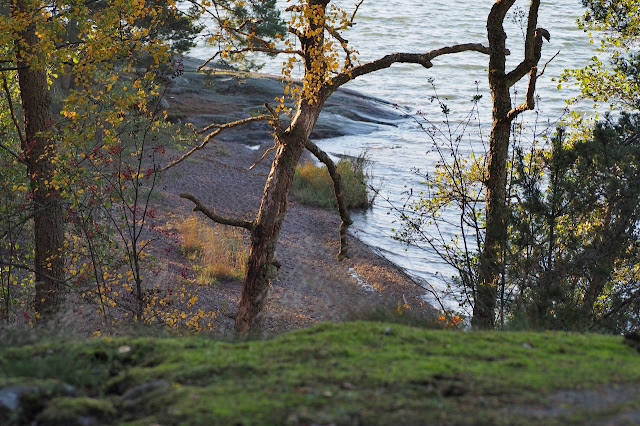Regular readers may remember my post on Milavida, the museum in Tampere
highlighting not only the history of the industrial family who built the mansion it is located in but
also showcasing temporary design-related exhibitions. Some time ago, I was
lucky to be driving through Tampere on my own and could take my time at the latest
show of haute couture dresses by the
Italian maestro Valentino. Fantastica!
 |
| Mikado silk with hand-painted coral patterns, 1968-9. |
Valentino Garavani was born in 1932 in a
small town in norther Italy. In those days, Paris was still the one and only home
for haute couture so also Valentino
lived there for a few years in his early and mid-20s studying fashion design
and working at fashion houses.
 |
| Silk chiffon, 1963-4. |
Italian luxury fashion is considered to
have born in 1951 when a Tuscan businessman arranged the ‘First Italian High
Fashion Show’ at his palazzo in Florence. It was a success and soon Italian
designers became very trendy and popular. Their Moda boutique type of fashion was a new concept in the business bringing
out less expensive creations than those of the established French fashion houses were. The emergence of this second high fashion centre brought Valentino back to Italy
and he started his own fashion house in Rome in 1959.
 |
| Silk and silk chiffon beaded with stones and corals, 1964-5. |
The saying that fashion is for those who
don’t have style beautifully applies to Valentino’s creations. Very early on, he
found his own style of glamorous timeless elegance never minding the general
trends in fashion. Exquisite fabrics, meticulous attention to detail, use of
traditional handcrafted methods such as embroidery, and decorations in beadwork and sequins, are
the premier characteristics of his designs.
 |
| Silk lurex completely embroidered with flowers in raffia fiber, beads, and sequins, 1967-8. |
Sometimes he designed a pattern completely
covering the fabric in lavish imaginative embroidery that was then executed with
impeccable craftsmanship at the atelier of Pino
Grasso in Milan. Several samples of such patterns were on display from the Grasso archives.
The show only exhibited a dozen or so
designs, most of them from the 1960s and 70s, on loan from private collections yet it offered plenty to explore. In addition to a couple of gowns in
Valentino’s signature colour, the red called rosso Valentino, there were some black and white gowns plus a
fabulously purple silk gown decorated with dyed ostrich feathers.
 |
| Silk chiffon with dyed ostrich feathers, 1974-5. |
 |
| Silk with silk taffeta corset top, 1982-3. |
 |
| Silk, 1976-7. |
All of these designs from 35-50 years ago
would be perfectly suitable to wear also today. Even the below ‘palace pyjamas’ in
printed silk from the late 1970s has stood the test of time beautifully although the context you might see it in might be different today.
 |
| Printed silk, 1976-7. |
Doesn’t it look like something you might spot on the streets of any of the
fashion metropolises today? Valentino certainly is a master of wearable works
of art, the last emperor of haute couture
as he is often referred to.
 |
| Silk faille, 1969-70. |
Valentino retired in 2008, at the age of 75.
Already ten years prior to that, he and the co-founder of the business Giancarlo Giammetti had sold the Valentino
group to an Italian holding company HdP. A few years thereafter, it was acquired by
the Italian textile manufacturer Marzotto, then by the London-based private
equity fund Permira, and finally in 2012 by the Qatari royal family’s
investment fund Mayhoola.
 |
| Silk taffeta, 1969-70. |
 |
| I don't know why but this design makes be think about Angelina Jolie. |
I’ve been wondering how it would feel to follow
the passing around of your brainchild when you no longer have any say in what
used to be your empire. Since the latest acquisition there is at least enough
financial backup the emperor doesn’t have to worry about the future of his legacy in that
respect. And he certainly doesn’t have to ‘sweep the streets he used to own’. But
still, how would it feel to let go when you have created something this grand?
Aren’t we mere mortals fortunate not to have
any empires to worry about. After all, everything will have to be left behind
in the end anyway.


































































